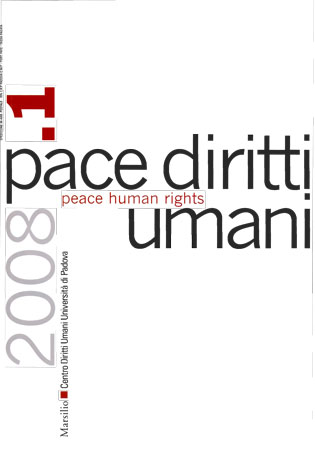Collections

L’ortodossia dei diritti umani nel Discorso di Benedetto XVI alle Nazioni Unite, 18 aprile 2008
- Contained in
- Pace diritti umani - Peace Human Rights, 1/2008
- Pubblication type
- Articolo / Saggio
- Pages
- 7-16
- Language
- IT
The Ortodoxy of Human Rights in the Speech of Benedict XVI at the United Nations, 18 April 2008
Antonio Papisca
The Universal Declaration of Human Rights and the Organisation of the United Nations: the universal «law» and the world «institution» viewed in a synergetic relationship. The speech of Benedict XVI develops the approach of the «signs of the times» contained in the encyclical Pacem in Terris of John XXIII. The Pope tributes historical-strategic merits to both the Universal Declaration and the United Nations for being at the source of a new legal system. He stresses that such system should be based on the «moral norm». In fact the international law of human rights is filled with values and principles of universal ethics, as it is explicitely proclaimed by Article 1 of the Universal Declaration. The human rights justice is a «substantive» one, rooted in the human nature and nurtured by the principles of universality, equality and interdependence and indivisibility of all human rights. A huge portion of ther speech is devoted to the crucial subject of the «responsibility to protect». This is a very delicate principle, that legitimates also military intervention and could be exploited for purposes and with means that are not consistent with the rationale of the United Nations Charter, for instance to carry out preventive war. Another part of the speech regards the right to religious freedom. The Pope emphasizes that faith and citizenship are compatibile and that the believers should have the real possibility to participate in the construction of the «social order». The author of the comment thinks that the Pope’s speech is a remarkable contribution to the effectiveness of the international law of human rights because it elucidates what should be considered as its ortodoxy. At the same time it gives a providential support to the United Nations in a moment in which the world organisation is lacking inspired and capable leadership.

